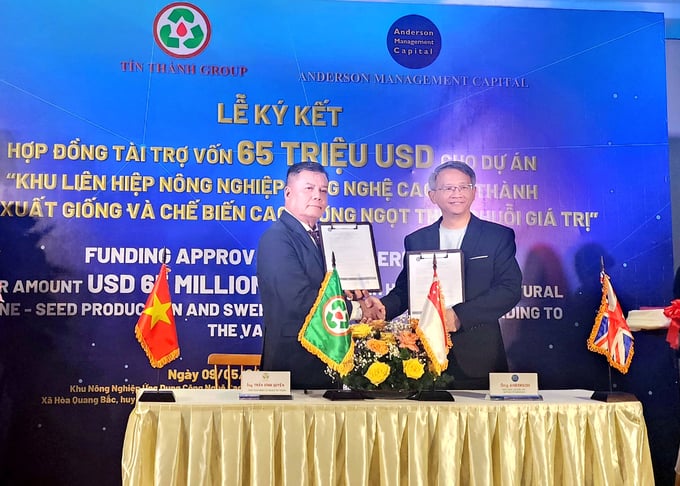June 19, 2025 | 04:31 GMT +7
June 19, 2025 | 04:31 GMT +7
Hotline: 0913.378.918
June 19, 2025 | 04:31 GMT +7
Hotline: 0913.378.918
Tin Thanh Group Joint Stock Company has just held a groundbreaking ceremony for the project "Tin Thanh High-tech Agricultural Complex - Seed production and processing of sweet sorghum along the value chain" at the Technology Application Agriculture Park Phu Yen highland (Hoa Quang Bac commune, Phu Hoa district, Phu Yen province). The project will deploy planting 1,000 hectares of sorghum in Phu Yen.

The project will deploy planting 1,000 hectares of sorghum in Phu Yen.
Through many years of trial planting, experimentation and domestication, Tin Thanh Group affirms that sorghum trees produce a very large biomass yield in a short time, ensuring the replacement of other fuels such as coal, oil, gas... Sorghum is a plant that uses nutrients in the soil very effectively and can withstand saline drought; the amount of water needed for the plant to grow well is only 1/5 of corn and 1/10 of sugarcane. In particular, sorghum is a crop that has been more than 90% mechanized, thereby bringing great benefits to agriculture and farmers. Sorghum is also the top short-term crop in terms of carbon absorption ability.
After harvest, sorghum is concentrated in the processing factory. Here, with the pressing and processing line to create goods serving the food industry such as: ethanol, food alcohol, sirup, sour grass (animal feed), liquefied CO2, ... The remaining part, after pressing to extract the juice, is fiber residue used as biomass fuel to supply electricity-generating boilers. These traditional products are very common with sorghum plants around the world; there are differences between Tin Thanh Group to produce a type of goods that the whole world needs and desperately needs based on 20 patents.
Tin Thanh Group has proposed a 10-year strategy to develop sorghum in Vietnam and the US with a total area of 2 million hectares. Along with that, it processes products from sorghum such as ethanol, food alcohol, sirup, sour grass (animal feed), and liquefied CO2. After pressing the juice, the remainder is fiber residue for biomass fuel supplied to the boiler to generate electricity.
In addition, Tin Thanh also aims to absorb 1 billion tons of carbon/year and develop a global carbon reduction circular transport program with 2 million trucks in the US, Europe and Brazil.
Mr. Tran Dinh Quyen, Chairman of the Board of Directors of Tin Thanh Group, said: "The strategic focus is to develop seedlings for 2 million hectares of sorghum on a closed platform from cultivation management, development management throughout the life cycle." growth period until harvesting and processing into two typical products of the Group. Throughout the farming cycle, sorghum is always measured and monitored for their ability to absorb heat energy and carbon daily to produce hydrogen for smart fuel tanks."

The signing ceremony of USD 65 million financing between Tinh Thanh Group and AMCap.
Tin Thanh Group cooperates with farmers in localities in the form of farmers contributing land to cultivate together and benefit from land rental and other benefits.
Specifically, when participating in this value chain, members are paid land rental costs of VND 50 million per ha each year, Share profits from the added value of the farming process from VND 40 to VND 50 million per ha each year, Get a job and receive a salary when registering to work at Tin Thanh Group's farms; Children and relatives are given priority to work for Tin Thanh Group after graduation; When the Company goes public on the stock exchange, farmers will share in the added value from the Company's stock value.
Prof. Dr. Vo Tong Xuan, representative of the Scientific Council and officers, staff, and workers of Tin Thanh Group, shared that Tin Thanh Group pioneered the launch of the High-tech Agricultural Complex project. Tin Thanh will bring many economic, social and environmental benefits. In particular, deploying sorghum in areas with harsh climates, such as the Central region, will contribute locally to hunger eradication and poverty reduction.
Over the past 7 years, Tin Thanh Group has imported and domesticated more than 50 types of sorghum varieties from the US and India to Vietnam, successfully planting and testing in many regions and different kinds of land in Vietnam. Provinces: An Giang, Soc Trang, Long An, Tay Ninh, Dak Lak, Phu Yen, Quang Nam, Quang Tri, etc. Specifically, sweet sorghum and biomass sorghum are short-term crops (95-115 days per crop), sow seeds once to harvest three crops per year, and are suitable for tropical regions.
At the event, Tin Thanh Group and Anderson Management Capital Fund (AMCap) signed a contract to finance USD 65 million for the project "Tin Thanh High-tech Agricultural Complex - Seed Production and Processing Sweet Sorghum along the value chain." AMCap belongs to a significant investment fund in the UK called Marcellus Capital Group, operates multi-nationally (UK, Switzerland, Dubai, Singapore...), and promotes investment in sustainable economies with positive factors to the environment and climate.
Translated by Huong Giang
/2025/06/17/3942-2-143243_548.jpg)
(VAN) Recently, in Sweden, the Secretary of the Binh Dinh Provincial Party Committee presented the Investment Registration Certificate for the 'Polyester Fabric Recycling Complex' project to SYRE Impact-AB Company.
/2025/06/12/3721-2-202745_83.jpg)
(VAN) TH made an impression at Seoul Food 2025 with its line of natural beverages, paving the way for Vietnamese food products to enter the South Korean market.

(VAN) Soc Trang's success in rice exports stems from a strategy of developing fragrant and specialty rice cultivation areas and standardizing production toward low-emission practices.
/2025/06/11/1311-5-120811_839.jpg)
(VAN) The pig farming industry is facing the challenge of comprehensive restructuring to meet requirements for quality, safety, traceability, and market expansion both domestically and for export.

(VAN) Vietnam considers participating in ALGROALBA in order to expand agricultural production, coordinate the assessment and effective exploitation potential land.
/2025/06/05/5314-1-184727_407.jpg)
(VAN) From seemingly worthless fish scales and skin, enzymes and lactic ferments can transform by-products into peptides, opening a sustainable, effective business direction and elevating Vietnamese seafood.

(VAN) TTC AgriS and IFC signed a strategic partnership to develop a sustainable agricultural value chain, aiming to achieve the Net Zero target by 2035.